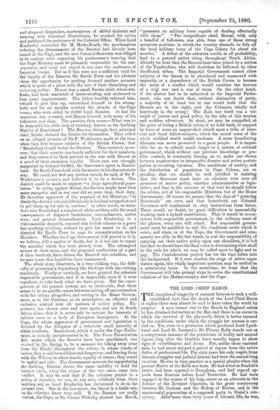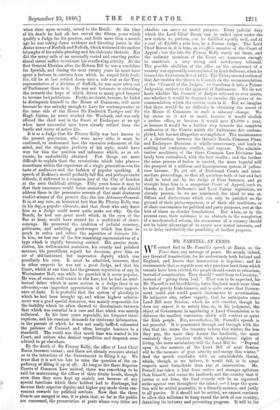THE LORD CHIEF BARON.
HE exceptional longevity of eminent lawyers is such a well- establishedd fact, that the death of the Lord Chief Baron at eighty-three may almost be said to have taken the world by surprise. A man cannot rise to the Bench in England unless he has obtained distinction at the Bar, and there is no career in which the survival of the physically fittest is better ensured by the conditions under which the struggle for success is car- ried on. Yet, even in a profession which produced Lord Lynd- hurst and Lord St. Leonard's, Sir Fitzroy Kelly stands out as a conspicuous instance of the persistence of bodily and mental vigour, long after the faculties have usually begun to show signs of enfeeblement and decay. For, unlike those eminent men, he had never enjoyed a period of repose from the active duties of professional life. For sixty years his only respite from forensic struggles and judicial labours had been the annual long vacation. He was in busy practice as a special pleader when the present Master of the Rolls was born. He had acted as Scarlett's junior, had been opposed to Brougham, and had argued ap- peals from Sessions before Lord Tenterden. He had been engaged in the course of his long career as an advocate in the defence of the Newport Chartists, in the great controversy between Mr. Gorham and the Bishop of Exeter, and in the unsuccessful prosecution of a supposed party to Orsini's con- spiracy. After'more than forty years of forensic life, he was, when close upon seventy, raised to the Bench. At the time of his death he had all but served the fifteen years which qualify a Judge for his pension, and little more than a month ago he was taking down evidence and directing juries in the Assize towns of Norfolk and Suffolk, which witnessed the earliest triumphs of his subtle pleading and his elaborate rhetoric. Nor did the many calls of an unusually varied and exacting profes- sional career suffice to exhaust his overflowing activity. At the first General Election after the Reform Bill he was a candidate for Ipswich, and during the next twenty years he must have spent a fortune in contests from which he reaped little fruit, for, till he at last settled down into a safe seat as the Tory representative of a division of Suffolk, he was more often out of Parliament than in it. He was not fortunate in obtaining the rewards the hope of which drives so many good lawyers to become bad politicians. Partly, no doubt, because, he failed to distinguish himself in the House of Commons, still more because he was unlucky enough to have for contemporaries on the same side of the House Sir Frederick Thesiger and Sir Hugh Cairns, he never reached the Woolsack, and was only offered the chief seat in the Court of Exchequer at an age when most successful men have already retired from the bustle and worry of active life.
It is as a Judge that Sir Fitzroy Kelly was best known to the present generation, who were never able, it must be confessed, to understand how the excessive refinement of his mind, and the singular prolixity of his style, could have won for him the position and influence which, as an ad- vocate, he undoubtedly obtained. Few things are more difficult to explain than the revolutions which take place— sometimes within the experience of a single generation—in the taste of audiences and the fashion of popular speaking. A speech of Erskine's would probably fall flat, and perhaps excite ridicule, if delivered to a common jury of the City of London at the next Guildhall sittings. Fifty years hence it may be that their successors would listen unmoved to one who should address them in the persuasive accents of that most dexterous verdict-winner of the present day, the late Attorney-General. It is, at any rate, an historical fact that Sir Fitzroy Kelly was, in his day, a popular advocate, and that those who only knew him as a Judge could never quite make out why. On the Bench, he had one great merit which, in the eyes of the Bar at least, would have atoned for a multitude of short- comings. He preserved the tradition of judicial courtesy, politeness, and unfailing good-temper which has done so much to refine and soften the asperities of forensic life. In him, we lose one of the few remaining representatives of a type which is rapidly becoming extinct. His precise enun- ciation, his well-rounded sentences, his courtly and polished manner, his punctilious regard for decorum, gave him an air of old-fashioned but impressive dignity which was peculiarly his own. It must be admitted, however, that in other respects he was not a great Judge, and that his Court, which at one time had the greatest reputation of any in Westminster Hall, was while he presided in it never popular. He was, of course, well versed in the Law, but he had an intel- lectual defect which is more serious in a Judge than in an advocate,—an imperfect appreciation of the relative import- ance of facts. It is probable that the system of pleading in which he had been brought up, and whose highest achieve- ment was a good special demurrer, was mainly responsible for the inability which he often showed to discriminate between that which was essential in a case and that which was merely collateral. In his later years especially, his frequent inter- ruptions, and his constant demands for irrelevant information, in the pursuit of which he was not easily baffled, exhausted the patience of Counsel, and often brought business to a standstill. The result was that much time was wasted in his Court, and suitors who desired expedition and despatch were advised to go elsewhere.
By the death of Sir Fitzroy Kelly, the office of Lord Chief Baron becomes vacant ; and there are already rumours abroad as to the intentions of the Government in filling it up. We trust that it is not too late to raise the question of the ex- pediency of filling it up at all. As long as the three Superior Courts of Common Law existed, there was something to be said for maintaining the offices of their titular heads, though even then they were kept up mainly not because of any special functions which their holders had to discharge, but because their superior dignity and higher pay made them con- venient rewards for political services. Now that the three Courts are merged in one, it is plain that, so far as the public are concerned, the preservation of posts whose very titles are obsolete can serve no useful purpose. Every judicial duty which the Lord Chief Baron can be called upon under the new system to perform, can be fulfilled equally well, and at a cost of £1,000 a year less, by a Puisne Judge. The Lord Chief Baron is, it is true, an ex-officio member of the Court of Appeal ; but the late Sir Fitzroy Kelly rarely sat there, and the ordinary members of the Court are numerous enough to constitute a very strong and satisfactory tribunal. The possible abolition of the office on the occurrence of a vacancy was apparently contemplated by Lord Selborne, when he framed the Judicature Act of 1873. The Thirty-second section of that Act enables the Queen in Council, on the recommendation of the " Council of the Judges," to transform it into a Puisne Judgeship, subject to the approval of Parliament. We do not know whether the Council of Judges referred to ever meets, nor whether it would be disposed to exercise the power of re- commendation which the section vests in it. But we imagine that there would be no difficulty in obtaining the assent of the House of Commons to such a salutary change. We lay stress on it not so much because it would abolish a useless office, or because it would save £1,000 a year, as because it would be a further step towards the complete unification of the Courts which the Judicature Act contem- plated, but has not altogether accomplished. The maintenance of a distinction between the Queen's Bench, Common Pleas, and Exchequer Divisions is wholly unnecessary, and leads to nothing but confusion, conflict., and expense. The adminis- trative machinery of the three Common Law Divisions has lately been centralised, with the best results ; and the further the same process of fusion is carried, the more hopeful will the prospect of a uniform and homogeneous system of judica- ture become. To get rid of Divisional Courts and inter- mediate proceedings, so that all questions both of law and fact shall be tried out by the Judge of First Instance, and go straight from him to a competent Court of Appeal, such as, thanks to Lord Selborne's and Lord Cairns' legislation, we already possess, is, we are convinced, the ideal to aim at. Offices and distinctions which can only be justified on the ground of their picturesqueness, or of their old traditions, or of their convenience for political and party purposes, rest at the best of times on slender foundations. But when, as in the present case, their existence is an obstacle to the completion of a much-needed reform, the occurrence of a vacancy should not be taken advantage of to create new vested interests, and so io delay indefinitely the possibility of further progress.



































 Previous page
Previous page